Retirement Visa in Portugal
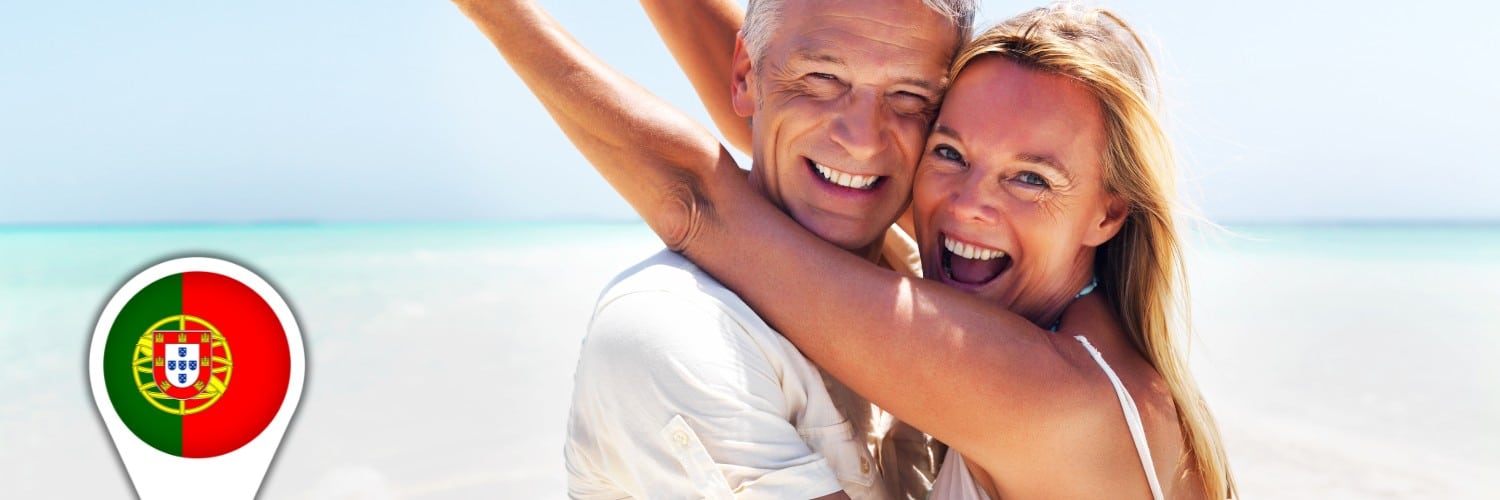
The Retirement Visa is available to foreign retirees wishing to live in Portugal. The technical visa name is D7 and offers great flexibility since the main requirement is that you have a solid passive income instead of being retired or meeting a certain age. To be eligible, applicants must have a stable income and financial means to support themselves during their stay in Portugal. The income requirement is usually set at a minimum of approximately €820 per month, which must come from abroad. Applicants must also have a clean criminal record. The Retirement Visa is valid initially for two years and subsequently for three years. The Portuguese Retirement Visa offers a unique advantage you won’t find in many other countries: after just 5 years, you can apply for Portuguese citizenship if you want!
Portuguese Retirement Visa: Top 5 Retirement Visa in the World
With a Retirement Visa, foreign retirees can enjoy the warm climate, beautiful beaches, and cultural richness of Portugal, while also taking advantage of the country’s affordable cost of living. As an immigration law firm, we can provide guidance on the eligibility requirements and application process for the Retirement Visa in Portugal, as well as assist clients with the necessary documentation to ensure a successful application with the Brazilian immigration system.
Eligibility
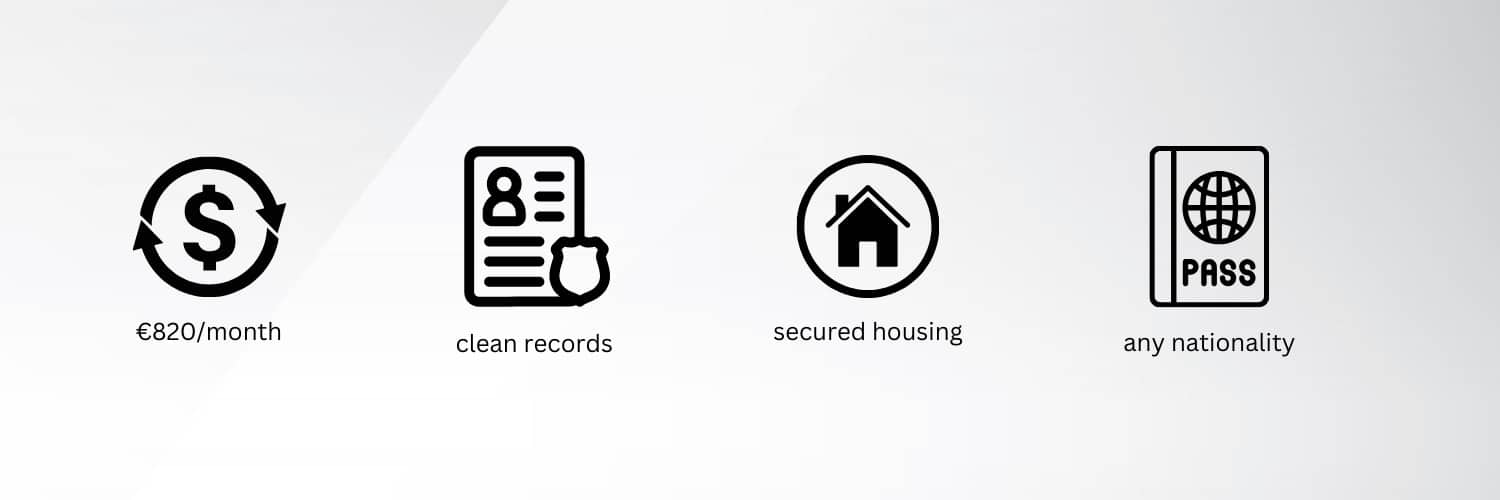
There is no minimum age for you to retire in Portugal. If you have consistent passive income, you are a good match, no matter if you are in your 60s, 50s, 40s, or even 30s!
Main requirements:
- Nationality: any nationality except those already in the European Union
- Passive income: show consistent passive income of at least €820 per month.
- Proof of funds: recommended €19,680 to be deposited into a Portuguese bank account.
- Criminal background: clean criminal record
- Physical presence: minimum of 16 months present in Portugal during the first 2 years
- Housing: lease for at least 12 months or own a property
More about the passive income
To apply for Portugal’s D7 Visa, you’ll need to show a stable passive income that exceeds the country’s minimum wage—currently at least €820 per month. This income could include pensions, rental yields, or earnings from investments like dividends, royalties, or other financial assets. If you’re bringing family along, the financial bar rises: add 50% of the base amount for your spouse and 30% for each child. It’s a way to ensure you can comfortably enjoy life in Portugal without working.
Examples of qualifying passive income:
- Pensions or retirement benefits
- Rental income from property
- Dividends from stock investments
- Interest from savings accounts or fixed deposits
- Royalties from published books or licensed patents
- Income from trusts or annuities
- Earnings from investment funds
- Proceeds from the sale of intellectual property rights
Interested? Schedule a consultation with our bilingual immigration attorneys now:
Why Portugal is the Ideal Destination for Retirees
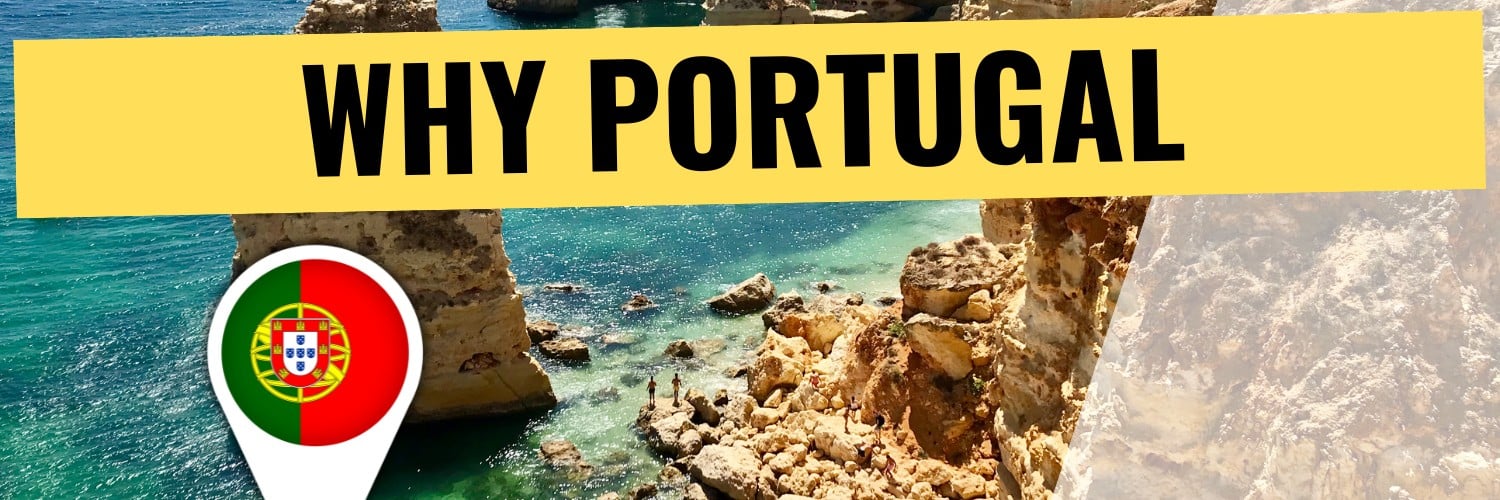
Portugal has become a popular destination for retirees from around the world, thanks to its numerous advantages. Here are the top 10 reasons why retirees should consider moving to Portugal for their post-retirement years:
-
Pleasant Climate: Portugal boasts a Mediterranean climate with warm summers and mild winters, making it an ideal location for those looking to escape harsh weather conditions.
-
Cost of Living: The cost of living in Portugal is relatively low compared to many Western European countries, allowing retirees to enjoy a higher standard of living at a lower cost.
-
Healthcare System: Portugal has a high-quality healthcare system that is both affordable and accessible, ensuring retirees have excellent medical care available when needed.
-
Safety: Portugal is consistently ranked as one of the safest countries in the world, offering a peaceful environment for retirees.
-
Friendly Community: The Portuguese are known for their friendly and welcoming nature, making it easy for expatriates to integrate and feel at home.
-
Beautiful Landscapes: From stunning beaches to picturesque countryside and historic cities, Portugal offers a diverse range of beautiful landscapes to explore and enjoy.
-
Tax Benefits: Portugal offers attractive tax benefits for retirees, including the Non-Habitual Resident (NHR) tax regime, which can significantly reduce the tax burden for qualifying expatriates.
-
Language: While Portuguese is the official language, English is widely spoken, particularly in tourist areas and larger cities, facilitating easier communication for English-speaking retirees.
-
Cultural Richness: Portugal has a rich cultural heritage, with abundant historical sites, museums, festivals, and traditional cuisine, providing endless opportunities for cultural engagement.
-
Lifestyle and Leisure: The relaxed Portuguese lifestyle is perfect for retirees. Additionally, there are numerous golf courses, walking trails, and other leisure activities tailored to the interests of the older population.
Choosing Portugal as a retirement destination can offer a blend of affordability, comfort, safety, and rich cultural experiences, making it an excellent choice for retirees looking to enjoy their golden years abroad.
Retirement Visa in Portugal
How To Get Started
#1 Contact us to get a free quote, or
#2 Schedule a Consultation now.
Portugal Retirement Visa Top Benefits

The Portugal D7 Visa offers a multitude of advantages for individuals seeking to relocate, whether for retirement, work, or simply a change of scenery. As a gateway to both a serene lifestyle and vibrant cultural experiences, this visa is tailored to those who wish to enjoy the benefits of living in one of Europe’s most welcoming countries. Below are some of the key benefits that make the D7 Visa an appealing choice for prospective residents.
Benefit #1 Residency in a Paradisiac Location
The D7 Visa grants the opportunity to live in Portugal, which is known for its astonishing scenery, pleasant climate, rich history, and high quality of life. This is particularly attractive for retirees and remote workers looking for a peaceful yet culturally rich environment to spend their years. Residency in Portugal also provides access to excellent healthcare services and a safe, stable living environment.
Benefit #2 Access to Schengen Area
Once you have the D7 Visa, you not only get the right to reside in Portugal but also the ability to travel freely within the Schengen Area. It is almost like getting a visa to a whole continent! This is especially advantageous for those who wish to explore Europe without the hassle of obtaining separate visas for each country. The freedom to travel across multiple European countries enhances both personal and professional opportunities.
Benefit #3 Pathway to Permanent Residency and Citizenship
Holders of the D7 Visa are on a clear path to permanent residency after five years and can apply for Portuguese citizenship after five years of permanent residency. This offers long-term security and the possibility to participate fully in Portuguese life, including voting rights and access to an EU passport, which comes with numerous benefits in itself.
Benefit #4 Public Healthcare System
One of the most significant advantages of the Portugal D7 Visa is access to Portugal’s highly regarded healthcare system. Once you become a resident under the D7 Visa, you are eligible to enroll in Portugal’s National Health Service (Serviço Nacional de Saúde, SNS), which is known for its comprehensive care and relatively low cost. This public healthcare system offers a wide range of services, from general medical care to specialized treatments and emergency services, ensuring that residents receive quality healthcare without substantial expenses.
Additionally, Portugal’s healthcare infrastructure is well-developed, with hospitals and clinics equipped with modern facilities and staffed by skilled healthcare professionals. This access not only enhances the quality of life for residents but also provides peace of mind, knowing that excellent medical care is readily available.
Benefit #5 Broad Resident’s Rights in Portugal
Becoming a resident of Portugal opens up a host of state-offered benefits that enhance both your personal and professional life. In addition to healthcare, education opportunities include Portugal’s National Education Service and schools, offering quality education from primary to higher education.
For those inclined towards entrepreneurship, residency permits conducting any professional activity as an independent professional, fostering business initiatives and self-employment. Additionally, residents are protected under the Portuguese legal system, which upholds rights and ensures justice.
Finally, access to vocational schooling offers practical training and skill development in various professions, enhancing job prospects and personal growth. These benefits collectively improve the quality of life, making Portugal an attractive destination for residents.
Retirement Visa in Portugal
How To Get Started
#1 Contact us to get a free quote, or
#2 Schedule a Consultation now.
Why You Should Hire Us to Apply for the Portuguese Retirement Visa
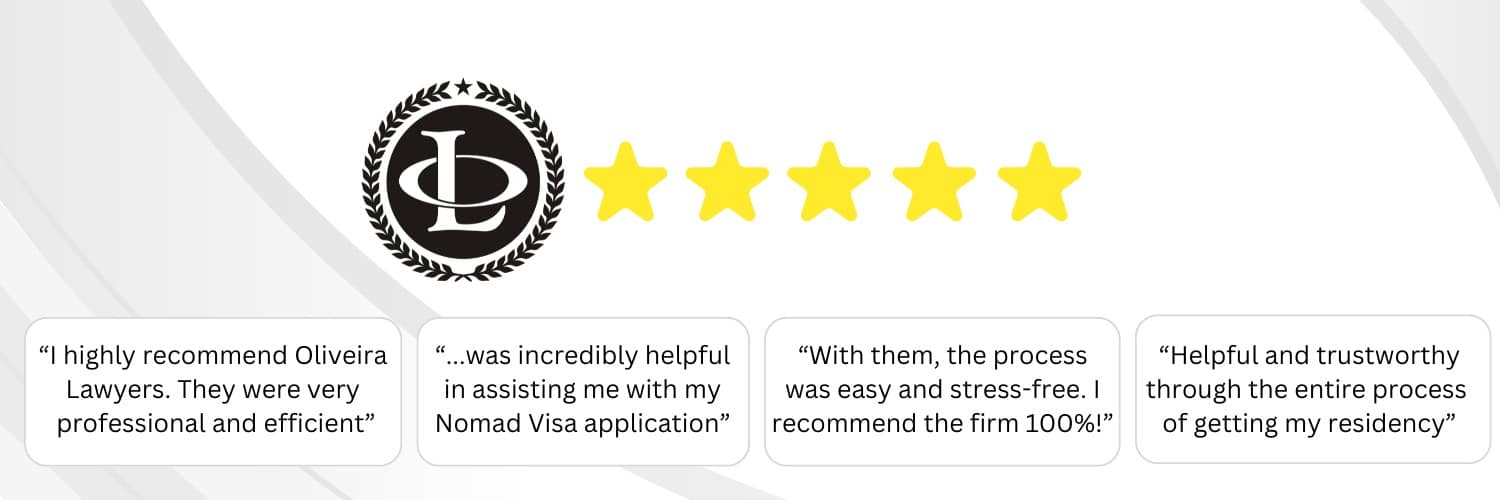
Disclosure: most of our reviews are related to immigration applications in Brazil.
Foreign citizens interested in applying for the Retirement Visa in Portugal can benefit from hiring our immigration law firm in several ways:
-
Expertise: As an immigration law firm, we have the expertise and experience to navigate the complex process of applying for a Retirement Visa in Portugal. We can provide guidance on eligibility requirements, necessary documentation, and application procedures.
-
Efficiency: Applying for a visa can be a time-consuming and stressful process. Our law firm can help streamline the process, ensuring that all necessary documentation is submitted on time and in the correct format.
-
Personalized service: Our law firm can provide personalized service, taking the time to understand the unique needs and circumstances of each client. This can help ensure that the application is tailored to meet the specific needs of the client.
-
Peace of mind: Applying for a visa can be a stressful process, especially if you are not familiar with the process. Hiring a law firm can provide peace of mind, knowing that you have an experienced team handling the application on your behalf.
-
Language support: For clients who do not speak Portuguese, our law firm can provide language support, ensuring that all communication with the Brazilian authorities is clear and accurate.
Overall, hiring our law firm can provide foreign citizens with the immigration support and guidance they need to successfully apply for a Retirement Visa in Brazil and enjoy all the benefits of spending their retirement years in this beautiful country.
Document Requirements
If you are a retiree planning to apply for Portugal’s D7 visa also known as Retirement Visa, there are two main steps involved. The first step is to apply for a D7 visa from abroad. This should be done through the Portuguese consulate in charge of your jurisdiction. For example, if you live in New York, you should apply for the visa through the Portuguese Consulate available in New York City.
First Stage Documents (Visa Application)
For the visa application stage, this is a sample list of the necessary documents you’ll need to prepare for your initial application:
- A passport that remains valid for a minimum of six months beyond the expiry date of the Portuguese passive income visa.
- Two recent passport-sized photographs in color.
- A written statement detailing the reasons for seeking residency in Portugal.
- A health insurance policy that covers you in Portugal, or alternatively, a sworn statement committing to obtain such insurance within 90 days of arrival.
- A criminal record certificate.
- Travel insurance coverage.
- Evidence of adequate financial resources available to you in Portugal.
- Documentation showing a stable, regular passive income.
- To qualify, you must demonstrate that you have a pension or other income that covers a full year: €8,460 for the main applicant, an additional 50% of that sum for a spouse, and 30% for each dependent child.
- Proof of secured accommodation in Portugal, which could include a title deed, a rental contract, or a property mortgage agreement.
The consulate has discretion in asking for additional documents if needed. After submitting all required documents, the consulate typically takes between 30 and 60 days to issue a decision on your initial visa application.
7 Steps to Secure the Retirement Visa in Portugal
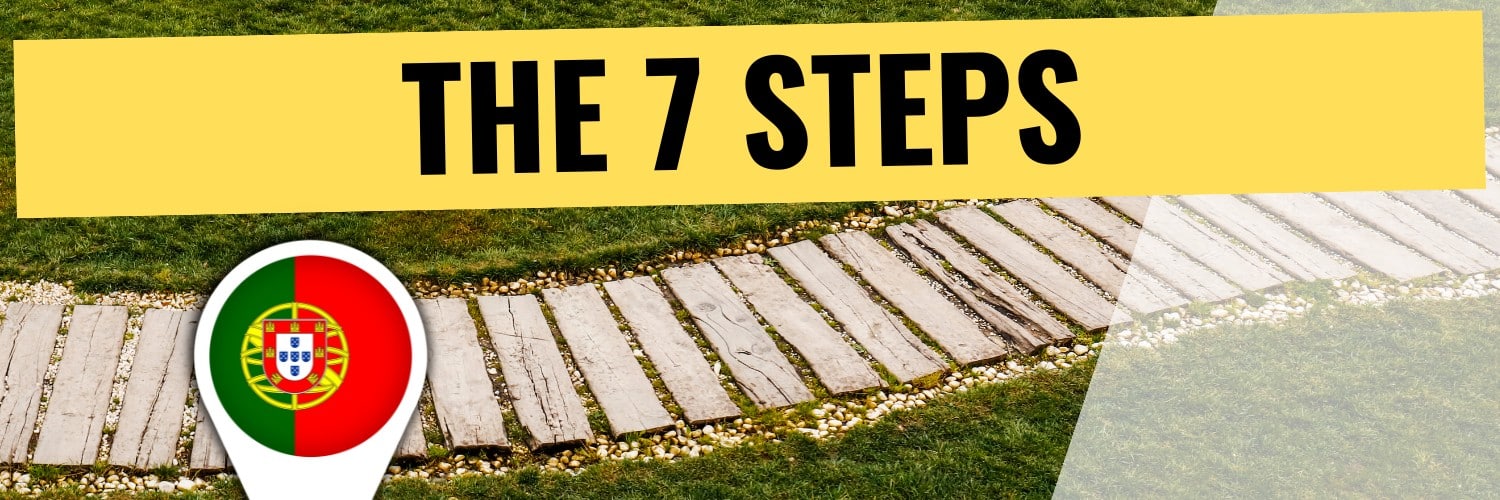
Step #1: Secure a licensed attorney
Relocating to another country is not a small challenge. Securing the services of a law firm when applying for the D7 Visa in Portugal is highly recommended due to the complexity of immigration laws and the intricacies of the application process. An experienced law firm can provide invaluable assistance in navigating the legal requirements, ensuring that all paperwork is correctly filled out, and that you meet all the necessary criteria. This expertise not only minimizes the risk of errors that could delay or jeopardize your application but also provides peace of mind by handling communications with Portuguese authorities. An attorney can also represent you in any legal matters that may arise during your relocation process, making the transition smoother and more secure.
Step #2: Acquire a NIF Number
The first step for retirees moving to Portugal is obtaining a Portuguese tax identification number, known as NIF (Número de Identificação Fiscal). This number is crucial for all fiscal activities in the country, including property rental, utility setup, and access to health services. Retirees can obtain a NIF through a power of attorney, which allows the process to be handled remotely by a legal representative without the need to travel to Portugal. This step is a prerequisite for many other aspects of setting up life in Portugal and is the first official step in establishing fiscal residency.
Step #3: Opening a Bank Account in Portugal
Once the NIF number is secured, the next step is opening a Portuguese bank account. This is also possible to accomplish from abroad and is vital for managing financial transactions within Portugal. A local bank account will be needed for everything from handling day-to-day expenses to setting up direct debits for utilities and rent. It simplifies the financial aspects of living in Portugal and is often necessary for proving financial stability as part of the visa application process. Having a bank account in Portugal also facilitates easier management of funds and can help in better financial planning for your life there.
Step #4: Securing Your Accommodation
Securing a place to live is a critical part of the D7 visa application. Retirees can either rent or purchase property in Portugal. Having your accommodation arranged is required to prove your ties and intentions to reside in Portugal as part of the visa application process.
Step #5: D7 Visa Application at the Portuguese Consulate
Retirees need to apply for the D7 visa at the nearest Portuguese consulate. This process involves scheduling an appointment and submitting the necessary documentation, which may vary by region but typically includes proof of income, proof of accommodation, and your Portuguese bank details. It’s advisable to check the specific requirements with your local consulate.
Step #6: Applying for a Residence Permit in Portugal
Upon arrival in Portugal with the D7 visa, which allows for a maximum of two entries and up to a four-month stay per entry, you must apply for a residence permit. This permit is essential for longer-term stays and integrating into the Portuguese system, including accessing healthcare and social services.
For retirees navigating these steps, it is often beneficial to consult with a professional to navigate the complexities of the bureaucratic system efficiently. Consulting experts can provide clarity and ease the transition, ensuring all requirements are met smoothly.
This structured approach ensures that retirees can manage their relocation to Portugal effectively, focusing on enjoying their retirement rather than getting bogged down by administrative complexities.
AIMA Appointment
Upon arrival in Portugal, scheduling an appointment with AIMA (Agency for Integration, Migration, and Asylum) is essential. At this meeting, you’ll submit your biometrics and advance your D7 visa into a residence application. The process includes paying the applicable fee and presenting necessary documents such as:
- Your temporary D7 visa copy
- Accommodation evidence
- Your Portuguese fiscal number (NIF)
AIMA’s main office is located at Avenida António Augusto de Aguiar, 20, in Lisbon. They started with 34 service counters throughout Portugal and planned to open at least 10 more branches within their first year of operation. Full list of AIMA addresses.
Step #7 Obtain your Residency Card
After your appointment with the Portuguese immigration authorities, you will be issued a D7 residency card, valid for one year. This temporary residence permit can be renewed after two years for an additional three years, provided you meet the requirements. After five years, you are eligible to apply for a permanent residence permit and may also pursue Portuguese nationality, subject to meeting the criteria set by Portuguese nationality law. Ensuring all documentation is prepared correctly is critical for a smooth application process.
Retirement Visa in Portugal
How To Get Started
#1 Contact us to get a free quote, or
#2 Schedule a Consultation now.
Family Members

The Portugal Retirement Visa extends its advantages not just to the primary applicant but also to their immediate family members, ensuring that the benefits of Portuguese residency can be enjoyed as a family unit. The minimum required yearly income of €8,460 will increase:
- 50 percent of this amount for the spouse
- 30 percent for each dependent child
The following family members qualify:
- Children or stepchildren who are minors
- Children or stepchildren who are disabled
- Spouses or partners
- Parents or in-laws who are financially dependent
Here are some of the key benefits that dependents of a D7 visa holder can expect:
-
Residency Rights: Dependents are granted the same residency rights as the main applicant, allowing them to live, study, and travel in Portugal.
-
Access to Education: Children of D7 visa holders have the right to attend Portuguese public schools, which provide high-quality education at minimal to no cost.
-
Healthcare Access: Like the main visa holder, dependents are entitled to access the public healthcare system in Portugal, which is recognized for its comprehensive and affordable medical services.
-
Freedom of Movement: Dependents can travel freely within the Schengen Area along with the main visa holder, facilitating ease of travel throughout Europe.
-
Employment Opportunities: Although the D7 visa is geared towards passive income earners, dependents who wish to work in Portugal can seek employment and contribute to the local economy.
-
Path to Permanent Residency and Citizenship: After five years of legal residency, dependents can also apply for permanent residency and eventually Portuguese citizenship, enjoying the same rights as any other EU citizen.
-
Inclusion in Family Reunification: The D7 visa process accommodates family reunification, allowing the visa holder to sponsor immediate family members like a spouse, minor children, and dependent relatives.
These benefits collectively ensure that families can transition smoothly to life in Portugal, maintaining their quality of life while immersing themselves in a new cultural and social environment.
Processing Time
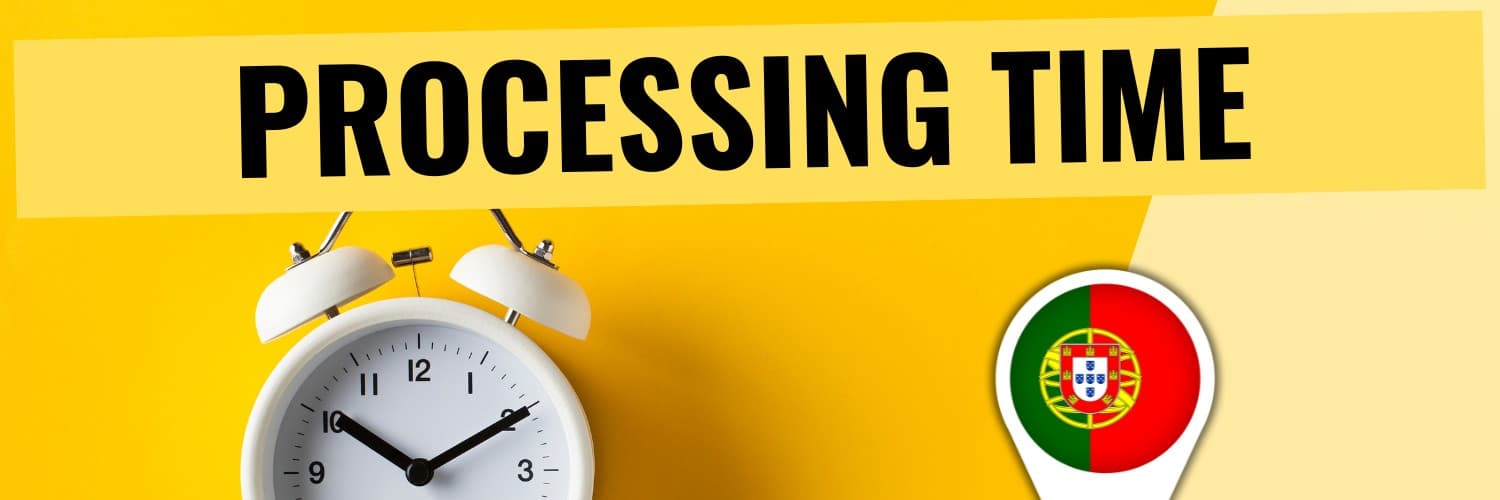
The application process for the Portugal D7 Visa involves a few key stages, each with its own timeline and requirements, which can take up to 90 days in total to complete. Here’s a refined overview of the process:
-
Document Collection: Before applying, ensure you have all necessary documents, including proof of regular passive income, proof of accommodation in Portugal, a clean criminal record, and valid health insurance. These documents are crucial for the smooth processing of your application.
-
Application Submission: You can submit your D7 Visa application at the Portuguese Consulate or Embassy in your home country. It’s important to have everything in order, including your Portuguese tax number (NIF), to avoid delays.
-
Processing Time: The processing time for the D7 Visa can range from 60 to 90 days, depending on the volume of applications received and the completeness of your application documents.
-
Notification: You will be notified of your visa status via email or phone once your application is processed.
-
Residency Permit Application: Upon receiving your D7 Visa, you must make an appointment with AIMA (the Portuguese immigration authority that replaced SEF). During this appointment, you will provide biometric data and finalize your residency permit application.
-
Residency Card Issuance: After your appointment, it takes about three weeks to 90 days for AIMA to issue your residency card, which will be sent to your address in Portugal.
Each of these steps requires careful preparation and attention to detail to ensure that you meet all legal requirements and avoid potential setbacks. The key to a smooth application process is to prepare all documents and fulfill all requirements meticulously before initiating the application process.
Retirement Visa in Portugal
How To Get Started
#1 Contact us to get a free quote, or
#2 Schedule a Consultation now.
D7 Visa for Retirees Frequent Questions

1. What is the Portugal D7 Visa?
The Portugal D7 Visa, also known as the Passive Income Visa, allows non-EU/EEA/Swiss citizens who have a reasonable net regular passive income to reside in Portugal. This visa is ideal for retirees or individuals with stable income from sources like pensions, real estate, investments, or intellectual property.
2. Who is eligible for the D7 Visa?
Eligibility for the D7 Visa requires proving a stable and regular passive income that meets or exceeds the minimum set by Portuguese authorities. As of 2024, the income requirement is approximately €820 per month for the main applicant, which is the equivalent of the Portuguese minimum wage.
3. Is there a minimum age requirement for the D7 Visa?
No, there is no minimum age requirement for the D7 Visa. It is available to any individual who can demonstrate the necessary passive income, making it a popular option for both retirees and younger individuals with stable income.
4. What types of income are considered for the D7 Visa?
Income considered for the D7 Visa can include pensions, rental income, dividends from investments, and royalties from intellectual property. The key requirement is that the income must be passive and sufficient to support the applicant’s lifestyle in Portugal.
5. How do I apply for the D7 Visa?
To apply for the D7 Visa, you must submit an application along with necessary documents such as proof of income, a valid passport, proof of accommodation in Portugal, a Portuguese tax identification number (NIF), and health insurance. Applications are submitted through the Portuguese Consulate or Embassy in your home country.
6. What is the processing time for the D7 Visa?
The processing time for the D7 Visa can vary, typically ranging from 60 to 90 days. Factors affecting this timeframe include the volume of applications and the completeness of your documentation.
7. Can I include my family in my D7 Visa application?
Yes, the D7 Visa allows for family reunification. Spouses, minor children, and dependent family members can be included in your application. Each additional family member may slightly increase the income requirement.
8. What are the benefits of the D7 Visa?
The D7 Visa offers several benefits including the right to live and travel within Portugal and the Schengen Area, access to Portuguese healthcare and education systems, and the pathway to permanent residency and citizenship after five years of continuous residence.
9. What happens after I receive my D7 Visa?
Upon arrival in Portugal with your D7 Visa, you must schedule an appointment with AIMA (Agency for Integration, Migration, and Asylum) to submit your biometric data and finalize your residence permit application. You will receive a temporary residence card, which is initially valid for one year and can be renewed.
10. How can I convert my temporary residence into permanent residency?
After five years of legal residence in Portugal on a D7 Visa, you can apply for a permanent residence permit. This status grants you the right to live indefinitely in Portugal, and you may also apply for Portuguese citizenship if you meet additional requirements such as language proficiency and a clean criminal record.
11. How long can I stay out of Portugal without affecting my D7 Visa status?
As a D7 Visa holder, you can be absent from Portugal for up to six consecutive months or eight non-consecutive months within a year without affecting your residency status. However, maintaining your status as a resident is crucial for eventual applications for permanent residency or citizenship.
12. Is it necessary to buy property in Portugal to qualify for the D7 Visa?
No, owning property in Portugal is not a requirement for the D7 Visa. You can meet the accommodation requirement through a rental agreement or even a lodging declaration signed by a host.
13. Can I work in Portugal with a D7 Visa?
Yes, the D7 Visa allows you to work in Portugal. Although designed for individuals with passive income, the visa does not restrict holders from engaging in professional activities.
14. How do I renew my D7 Visa?
The D7 Visa itself does not need renewal, but the associated residence permit does. Initially granted for one year, the residence permit can be renewed for two subsequent periods of two years each. You must prove continued income and residence in Portugal.
15. What healthcare benefits do I receive with the D7 Visa?
Holders of the D7 Visa have access to the Portuguese public health system after registering and contributing to the social security system. This ensures comprehensive healthcare coverage similar to that of Portuguese citizens.
16. What is the minimum financial requirement for the D7 Visa?
The financial requirement for the D7 Visa is based on the Portuguese minimum wage and varies depending on the number of family members included in the application. For 2024, the main applicant needs a minimum income of around €820 per month.
17. Can I travel within the EU with a D7 Visa?
Yes, the D7 Visa allows you to travel within the Schengen Area for up to 90 days within any 180-day period, which facilitates easy travel across Europe.
18. What happens if my D7 Visa application is rejected?
If your D7 Visa application is rejected, you will receive a notification explaining the reasons for the rejection. Applicants can address these reasons in a subsequent application or appeal the decision within the legal framework provided by Portuguese immigration law.
19. Are there language requirements for the D7 Visa?
There are no Portuguese language requirements to obtain the D7 Visa. However, language proficiency is a requirement for those applying for permanent residency or citizenship after five years.
20. Can I apply for the D7 Visa while already in Portugal?
It is generally recommended to apply for the D7 Visa from your country of residence. However, under certain circumstances and with the right legal guidance, you can convert a different visa type to a D7 Visa while in Portugal.
Retirement Visa in Portugal
How To Get Started
[email protected]
(214) 432-8100
+55-21-2018-1225
#1 Contact us to get a free quote, or
#2 Schedule a Consultation now.


